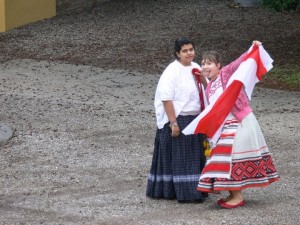Unconscious Biases and the Beauty of the Unknown
By Masha Pupko, Programs and Services Intern
If there is one thing that unites people, it is that we are all consumers of information. First we learn from our caregivers, then our educators, our peers, mass culture and our own experiences. Much of what we learn, think and do is done at an unconscious level. In order to process the vast amount of information that we consume on daily basis, we organize specific examples into broad categories. Once we do the sorting, the meanings associated with that category are activated and influence our interactions with individuals. Consequentially, all of us, including you and me, hold implicit biases – automatic attitudes or stereotypes about people based upon their belonging to a particular category.
Imagine there is a pilot in front of you. Who do you see, a male or a female? If I say, “a Mexican immigrant” or “a Black male?” What kind of person do you imagine? How is he/she dressed? What is their facial expression? Why don’t you see him/her as a businessman or smiling? If I ask you to imagine a criminal, of what gender and race would he or she be? How do you picture a family? Male and female and their children? Two females? Grandmas and granddads, cousins, sisters, brothers? Would you employ a person with a criminal record? Are overweight people lazy? Would you trust a Muslim as much as you would trust a Christian? Can you out drink a Russian?
So how do we deal with all of these pictures and thoughts in our heads that direct our attitudes and behaviors even before we get to know the person that we have to engage with? Whom are we most likely to pre-judge? Since most of us live in segregation, we spend most of our life with people who are “like us.” We share similar interests with them, class status, nationality, ethnicity, language, and skin color. We consume a lot of similar information, we share views about “the other” that is usually dehumanized and reduced to a label. The world we live in, however, is not as homogeneous as the social bubbles that we form. The world is made up of individuals from different socioeconomic, ethnic, educational, religious, and cultural backgrounds. We all have different views, perceptions of how things are ought to be. Moreover, “the other” is never just good or bad. Just like you and me, he or she has different shades of personality and unique individuality that cannot be labeled.
| Masha and her friend from Guatemala |
Five years ago I left home of Belarus to pursue a good quality education abroad. In the past five years I have lived in three different countries in order to achieve my dream. When I started my journey I was much younger, barely spoke any English and had no one to guide me through this new world that I was entering. What I have learned over the years from being away from home, is that being able to break out of my comfort zone is the greatest gift I got from life. Intentionally challenging my ideas, challenging my tastes, my beliefs by interacting with people from different cultures and backgrounds, living in places that I did not know has pushed me to step into other people’s shoes and give them immunity from my unconscious judgment before they actually earn it. I learned how what we call “cultural differences”, when explored deeper, turn into similarities and connects people. I came to realize that the world is too full of beautiful “unknowns” for us to get caught up in the stereotypes and fears of “the other.”
As an immigrant, an international student, and an emerging young professional in the United States, I am fascinated by the work The International Center does in educating various businesses and individuals about unfamiliar cultures. The Center helps uncover the unconscious biases, encourages one to ask “why” and consequentially leaves him or her with an improved outlook. I believe that The International Center is the best teacher in the field of global competency within the region, and I am confident that their commitment to Indiana’s international growth will inspire something very unique here.




